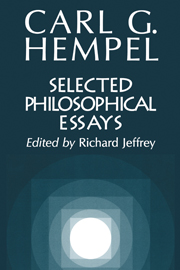Book contents
- Frontmatter
- Contents
- Preface
- Dates
- Introduction
- TRUTH
- Chapter 1 On the Logical Positivists' Theory of Truth
- Chapter 2 Some Remarks on “Facts” and Propositions
- Chapter 3 Some Remarks on Empiricism
- Chapter 4 The Problem of Truth
- Chapter 5 The Irrelevance of the Concept of Truth for the Critical Appraisal of Scientific Theories
- PROBABILITY
- METHODOLOGY
- MEMOIRS
- C. G. HEMPEL'S PUBLICATIONS
- Index
Chapter 4 - The Problem of Truth
Published online by Cambridge University Press: 05 June 2012
- Frontmatter
- Contents
- Preface
- Dates
- Introduction
- TRUTH
- Chapter 1 On the Logical Positivists' Theory of Truth
- Chapter 2 Some Remarks on “Facts” and Propositions
- Chapter 3 Some Remarks on Empiricism
- Chapter 4 The Problem of Truth
- Chapter 5 The Irrelevance of the Concept of Truth for the Critical Appraisal of Scientific Theories
- PROBABILITY
- METHODOLOGY
- MEMOIRS
- C. G. HEMPEL'S PUBLICATIONS
- Index
Summary
INTRODUCTION
§1. The problem of truth is one of the great classical problems of philosophy; and philosophy in its long history has given many different answers to the question of what truth is. The following considerations do not, however, concern the history of this question; rather, they examine the problem of truth from a systematic point of view. To begin with, the question at issue can be formulated in the following manner: What are the conditions for calling a proposition true; that is to say: How can one decide whether a given proposition is true or false? The examination of this problem will also permit us to respond to questions such as that of knowing whether there exist propositions which are absolutely and definitively true or whether each truth possesses a relative and provisional character – and to other questions of this kind, which are ardently discussed in philosophy. Furthermore, the envisaged inquiry will lead us to consequences which perhaps can contribute to clarifying certain points of the discussion opened in this periodical by Neurath and Petzäll – and which concerns the theory of science of the Vienna Circle.
The method by which we will attempt to establish the criteria for truth will not be that of synthetic and speculative philosophy; it will rather consist in a logical and methodological analysis of the procedures which are employed, in science, to verify a proposition; for it is only by such an analysis that one can hope to determine the character of truth in the only sense that matters for our scientific and everyday knowledge.
- Type
- Chapter
- Information
- Selected Philosophical Essays , pp. 35 - 74Publisher: Cambridge University PressPrint publication year: 2000



